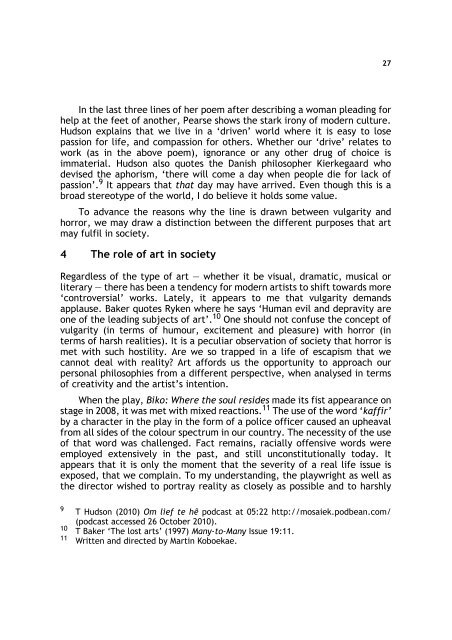Download this publication - PULP - University of Pretoria
Download this publication - PULP - University of Pretoria
Download this publication - PULP - University of Pretoria
You also want an ePaper? Increase the reach of your titles
YUMPU automatically turns print PDFs into web optimized ePapers that Google loves.
In the last three lines <strong>of</strong> her poem after describing a woman pleading for<br />
help at the feet <strong>of</strong> another, Pearse shows the stark irony <strong>of</strong> modern culture.<br />
Hudson explains that we live in a ‘driven’ world where it is easy to lose<br />
passion for life, and compassion for others. Whether our ‘drive’ relates to<br />
work (as in the above poem), ignorance or any other drug <strong>of</strong> choice is<br />
immaterial. Hudson also quotes the Danish philosopher Kierkegaard who<br />
devised the aphorism, ‘there will come a day when people die for lack <strong>of</strong><br />
passion’. 9 It appears that that day may have arrived. Even though <strong>this</strong> is a<br />
broad stereotype <strong>of</strong> the world, I do believe it holds some value.<br />
To advance the reasons why the line is drawn between vulgarity and<br />
horror, we may draw a distinction between the different purposes that art<br />
may fulfil in society.<br />
4 The role <strong>of</strong> art in society<br />
Regardless <strong>of</strong> the type <strong>of</strong> art — whether it be visual, dramatic, musical or<br />
literary — there has been a tendency for modern artists to shift towards more<br />
‘controversial’ works. Lately, it appears to me that vulgarity demands<br />
applause. Baker quotes Ryken where he says ‘Human evil and depravity are<br />
one <strong>of</strong> the leading subjects <strong>of</strong> art’. 10 One should not confuse the concept <strong>of</strong><br />
vulgarity (in terms <strong>of</strong> humour, excitement and pleasure) with horror (in<br />
terms <strong>of</strong> harsh realities). It is a peculiar observation <strong>of</strong> society that horror is<br />
met with such hostility. Are we so trapped in a life <strong>of</strong> escapism that we<br />
cannot deal with reality? Art affords us the opportunity to approach our<br />
personal philosophies from a different perspective, when analysed in terms<br />
<strong>of</strong> creativity and the artist’s intention.<br />
When the play, Biko: Where the soul resides made its fist appearance on<br />
stage in 2008, it was met with mixed reactions. 11 The use <strong>of</strong> the word ‘kaffir’<br />
by a character in the play in the form <strong>of</strong> a police <strong>of</strong>ficer caused an upheaval<br />
from all sides <strong>of</strong> the colour spectrum in our country. The necessity <strong>of</strong> the use<br />
<strong>of</strong> that word was challenged. Fact remains, racially <strong>of</strong>fensive words were<br />
employed extensively in the past, and still unconstitutionally today. It<br />
appears that it is only the moment that the severity <strong>of</strong> a real life issue is<br />
exposed, that we complain. To my understanding, the playwright as well as<br />
the director wished to portray reality as closely as possible and to harshly<br />
9 T Hudson (2010) Om lief te hê podcast at 05:22 http://mosaiek.podbean.com/<br />
(podcast accessed 26 October 2010).<br />
10 T Baker ‘The lost arts’ (1997) Many-to-Many Issue 19:11.<br />
11 Written and directed by Martin Koboekae.<br />
27

















